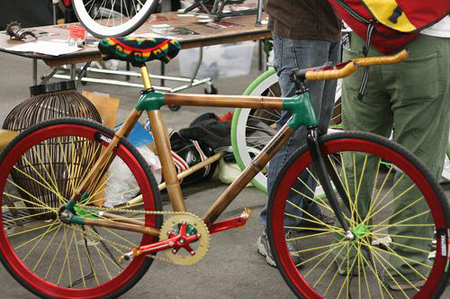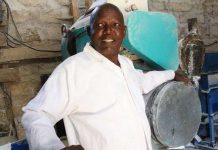(A column highlighting scientific, technological, engineering, and design innovation in Africa)
Teenage social entrepreneur Winifred Selby, along with colleagues Bernice Dapaah and Kwame Kyei, established Ghana Bamboo Bikes Initiative in 2009 to address the pressing issues of affordable and reliable transportation; unemployment, especially among women and youth; and environment degradation.
A nonprofit enterprise based in Kumasi, Ghana’s second biggest city after the capital Accra, Ghana Bamboo Bikes Initiative uses locally grown bamboo and used bike parts to design hand-made bikes.
“I always disagree when I hear that Africans are poor. I disagree because we are blessed with rich resources,” states Selby, 19, a graduate of Joy Standard College in Ghana.
Bamboo, which grows abundantly in Ghana, is known for its durability and high strength-to-weight ratio. Though often viewed as a nuisance crop, some farmers are cultivating it as an alternative to wood for such uses as furniture making and scaffolding. Local farms now supply the Ghana Bamboo Bikes factory.
This increased cultivation and use of bamboo is helping to preserve and rehabilitate Ghana’s dwindling forests. Moreover, bamboo improves air and water quality in areas where it is harvested. Its root system reduces soil erosion, a major concern for many farmers.
To make the bicycle frames, the bamboo is first stripped of branches, inspected for structural integrity, and then cut into pre-determined frame lengths. Each frame comprises seven lengths. These are mounted and supported by steel tubes and rings, and the ends sealed with fiber and industrial strength epoxy. Once the epoxy is dry, the frame is coated with wood sealant to protect the bamboo from bugs and rot. After this dries, the top layer of the bamboo is shaved and the joints are filed to the desired shape. The frame is then sanded and sprayed three times with an auto sealant mixture for a clean, waterproof finish.
Bamboo bikes are suitable for Africa’s rough terrain and for carrying large loads and passengers. Their construction is much less energy intensive than production of steel bikes. Producing a steel bicycle frame emits about 5 kilograms of carbon dioxide.
Today, Ghana Bamboo Bike employs about 30 young women, who train each other, and produces 60 to 100 bikes a month The company earns about US$10,000 a month from sales, including exports to Europe. Each trained employee is equipped to set up a production base anywhere in the country and employ at least five or six people.
In addition to a host of global awards and recognition, Selby was one of 12 finalists for the 2014 Anzisha Prize, a partnership between the African Leadership Academy and The MasterCard Foundation that celebrates innovative African entrepreneurs between the ages of 15 and 22.













